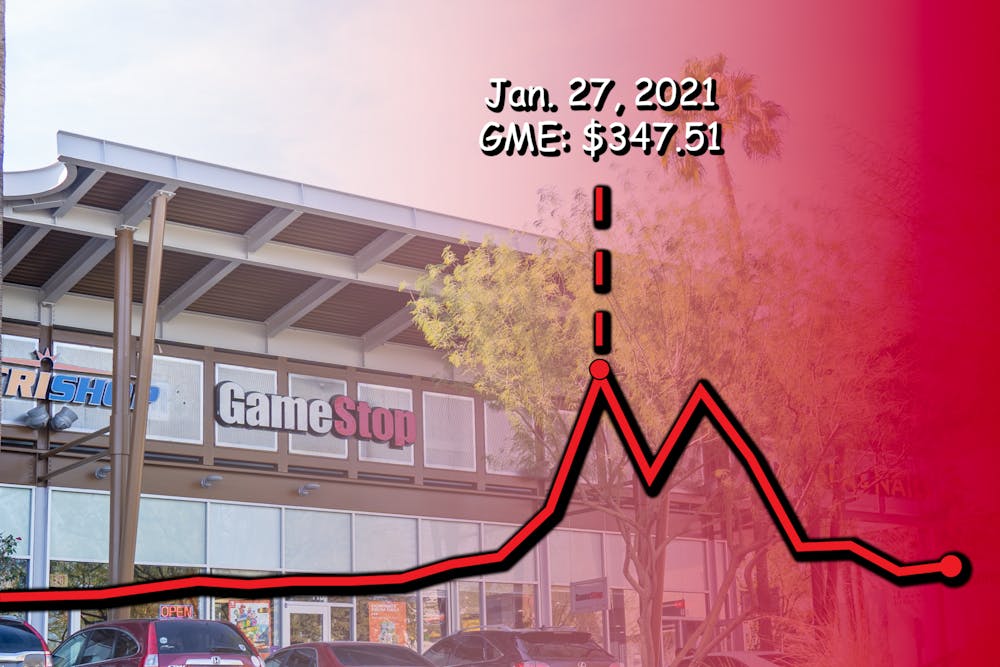Last month, the brick and mortar game retailer GameStop made unexpected waves in the finance community, and some ASU students went along for the ride.
A Reddit forum for individual investors called r/WallStreetBets went viral for creating what's called a short squeeze.
Debra Radway, a financial planner and lecturer at the W.P. Carey School of Business, said that investors typically make “long” investments, in which stocks are purchased to be held on to and grow in value for a long time. A “short,” Radway said, is when investors think a stock’s price is overvalued and they try to bring it down.
Radway explained that when a company shorts a stock, they borrow the shares from a brokerage company to sell that they must return later.
"You can’t sell a stock you don't own, right?" Radway said. "But you can borrow shares from a broker, sell those shares, and then close out your position by buying the shares back after the price has fallen."
When this was done with GameStop’s stock, investors on the subreddit took notice and began buying the stocks to raise the price. The redditors saw the short and many thought that the companies were severely undervaluing the retailer.
GameStop’s success had declined because their business model prioritizes in-person sales while e-commerce continues to rise in popularity, especially throughout the COVID-19 pandemic. The redditors, however, noticed that the retailer wasn’t actually doing as poorly as the investors had made it seem.
The attention the subreddit drew to the short caused many individuals to buy the stock, thus driving up the price. Stocks for other companies including AMC Theaters and the telecommunications company Nokia also went viral on social media, as well as the cryptocurrency Dogecoin.
Radway said she doubts this will have a long-term impact on the market but it’s difficult to say certainly, and she fears that some new investors were misled into thinking they would make a profit when they might take losses instead.
Though the stock’s popularity has certainly died down, some investors, including ASU students, think this was about more than just profit.
Senior biological sciences major Alejandro Estrada said he wasn’t familiar with the subreddit but caught on early because he frequently checks stocks on his personal investment applications. Estrada bought stocks for GameStop, Nokia and AMC and when he learned about why the stock was rising so much, it became a matter of principle.
Estrada said what the individual investors were doing on the subreddit isn’t anything new except that the people doing it aren’t hedge funds.
“It's not anything illegal or anything wrong, it's just the fact that (hedge funds) don't like it when the tables are turned, they don't like it when it happens to them,” Estrada said.
Matthew Kling, a senior economics and supply chain management major, said he didn’t personally invest but has been following the development of the stock and friends who invested closely.
When Kling's friend, a member of the r/WallStreetBets subreddit, told him to buy stock in GameStop in the days leading up to its explosion online, he ignored him and wrote it off as a trend. Kling said that the reception of the short squeeze pointed out double standards between everyday investors and major companies.
Kling said he saw many media outlets cover the short squeeze negatively and call for regulation, but that hedge funds can do the same thing without consequences.
“If anything, I feel it’s evidence that the system is rigged against normal people,” Kling said.
Kling also said that though he thinks there are double standards, this also showed the power individual investors can sometimes have over hedge funds.
“I think this is interesting because … these retail traders are able to work in tandem and make these really large financial decisions that can negatively or positively affect the large Wall Street giants,” Kling said. “So I think it's interesting that all these guys on Reddit can now, for lack of a better word, ‘stick it to the man.’ ”
Estrada said that though he didn’t know anything about the stock’s reason for rising when he first bought in, he doesn’t care if he makes a profit.
"The message was greater than the money for me,” Estrada said. “I haven't touched that money, that money’s just staying there. I’m not gonna add as heavily as I would to it, but I’m just gonna keep that money there and let it do its thing."
Reach the reporter at gmlieber@asu.edu and follow @G_Mira_ on Twitter.
Like The State Press on Facebook and follow @statepress on Twitter.
Continue supporting student journalism and donate to The State Press today.




